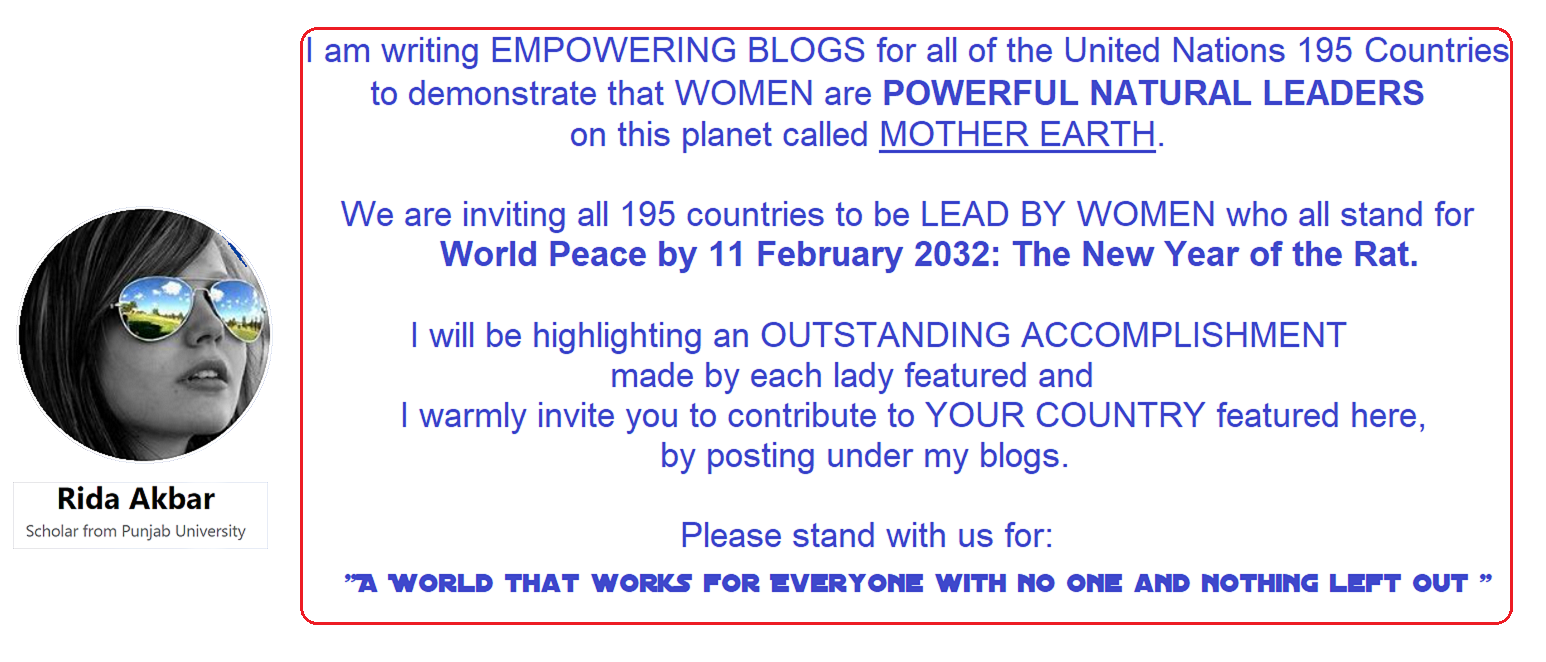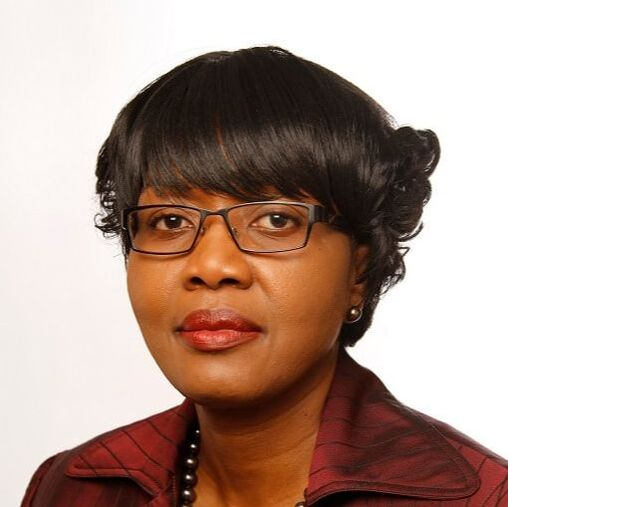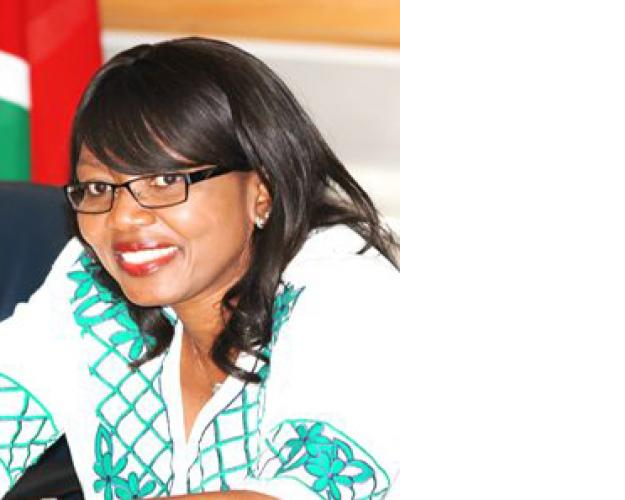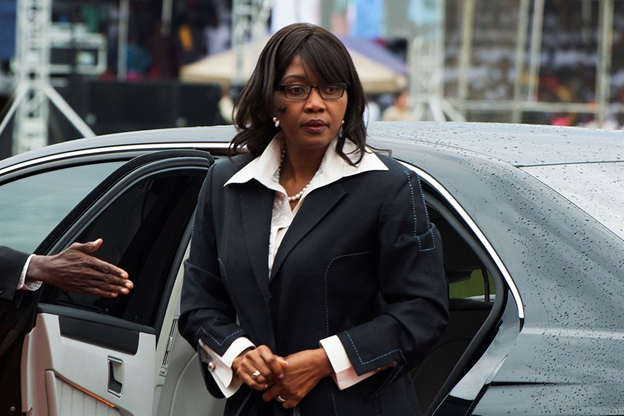
Saara Kuugongelwa

PC CREDIT: Image via the Office of the Prime Minister
Saara Kuugongelwa-Amadhila
Amadhila (born 12 October 1967) is the current Prime Minister of Namibia, in office since 21 March 2015. Kuugongelwa-Amadhila is a member of the South West Africa People's Organization (SWAPO). She has been a member of the National Assembly of Namibia since 1995 and served as Minister of Finance from 2003 to 2015. She is the first woman to serve as Prime Minister of Namibia.
Exile
Born in Otamanzi, South West Africa (present day Namibia), she went into exile with SWAPO in 1980 at the age of 13 and left for Sierra Leone in 1982 at the age of 15. She attended Koidu Girls Secondary School from 1982 to 1984 and Saint Joseph's Secondary School from 1984 to 1987. From 1991 to 1994, she attended Lincoln University in Pennsylvania, United States, where she graduated with a degree in economics.
Political career
Kuugongelwa-Amadhila returned to Namibia following her graduation from Lincoln University and took a position as a desk officer in the Office of the President under President Sam Nujoma. In 1995, at the age of 27, she was named Director General of the National Planning Commission, a position in the rank of a minister. She was appointed as Minister of Finance in 2003. On Heroes' Day 2014, she was conferred the Most Brilliant Order of the Sun, Second Class. Alongside President Hage Geingob, she was sworn in as the 4th Prime Minister of Namibia on 21 March 2015. She is the first woman to hold the position In May 2016, she took part in "A Conversation with The Right Honourable Saara Kuugongelwa-Amadhila, Prime Minister of the Republic of Namibia," a moderated discussion with Wilson Center's Women in Public Service Project, the Wilson Center Africa Program, and the Constituency for Africa She has spoken about gender equality on numerous occasions, including during the Mali Prime Minister Modibo Keita's visit and in a speech (read by Christine Hoebes on her behalf) at the 10th Namibian Women's Summit where she stated that it would take 70 years to close the gender pay gap across Africa.

In May 2016, she took part in “A Conversation with The Right Honourable Saara Kuugongelwa-Amadhila, Prime Minister of the Republic of Namibia,” a moderated discussion with Wilson Center’s Women in Public Service Project, the Wilson Center Africa Program, and the Constituency for Africa. She has spoken about gender equality on numerous occasions, including during the Mali Prime Minister Modibo Keita’s visit and in a speech (read by Christine Hoebes on her behalf) at the 10th Namibian Women’s Summit where she stated that it would take 70 years to close the gender pay gap across Africa. According to Astrologers, Saara zodiac sign is Capricorn Saara Kuugongelwa-Amadhila (born 12 October 1967) is the fourth and current Prime Minister of Namibia, in office since 21 March 2015. Kuugongelwa-Amadhila is a member of the South West Africa People’s Organization (SWAPO). She has been a member of the National Assembly of Namibia since 1995 and served as Minister of Finance from 2003 to 2015. She is the first woman to serve as Prime Minister of Namibia. On Heroes’ Day 2014, she was conferred the Most Brilliant Order of the Sun, Second Class.
Ethnicity of Saara Kuugongelwa
Many peoples want to know what is Saara Kuugongelwa ethnicity, nationality, Ancestry & Race? Let's check it out! As per public resource, IMDb & Wikipedia, Saara Kuugongelwa's ethnicity is Not Known. Saara Kuugongelwa Net Worth Saara is one of the richest Politician & listed on most popular Politician. According to our analysis, Wikipedia, Forbes & Business Insider, Saara Kuugongelwa net worth is approximately $1 Million - $3 Million.
SAARA KUUGONGELWA NET WORTH & SALARY
Net Worth $1 Million - $3 Million Salary Under Review Source of Income Politician Cars Not Available House Living In Own House. Born in Otamanzi, South West Africa (present day Namibia), she went into exile with SWAPO in 1980 at the age of 13 and left for Sierra Leone in 1982 at the age of 15. She attended Koidu Girls Secondary School from 1982 to 1984 and Saint Joseph’s Secondary School from 1984 to 1987. From 1991 to 1994, she attended Lincoln University in Pennsylvania, United States, where she graduated with a degree in economics. Saara Kuugongelwa Height Saara Kuugongelwa's height Not available right now. Saara weight Not Known & body measurements will update soon. SAARA KUUGONGELWA HEIGHT & BODY STATS Height Unknown Weight Not Known Body Measurements Under Review Eye Color Not Available Hair Color Not Available Feet/Shoe Size Not Available Kuugongelwa-Amadhila returned to Namibia following her graduation from Lincoln University and took a position as a desk officer in the Office of the President under President Sam Nujoma. In 1995, at the age of 27, she was named Director General of the National Planning Commission, a position in the rank of a minister. She was appointed as Minister of Finance in 2003. Who is Saara Kuugongelwa dating? According to our records, Saara Kuugongelwa is possibily single & has not been previously engaged. As of June 2021, Saara Kuugongelwa’s is not dating anyone. Relationships Record: We have no records of past relationships for Saara Kuugongelwa. You may help us to build the dating records for Saara Kuugongelwa! Facts & Trivia Saara Ranked on the list of most popular Politician. Also ranked in the elit list of famous celebrity born in Namibia. Saara Kuugongelwa celebrates birthday on October 12 of every year.
GENDER EQUALITY NOT ONLY WHERE GENDER VIOLENCE IS RAMPANT BUT EVERYWHERE
“Gender equity has to be promoted beyond the public sector to cover all segments of society, beyond representation in leadership positions, to permeate all aspects of human endeavour, if we are to realize its benefits,” said the Prime Minister, the Right Honourable Saara Kuugongelwa-Amadhila. Though strides have been made in Namibia and globally, much work still needs to be done to achieve full gender equality. Tangible ways to achieve this and to empower women and young people were the focus of discussions at a high-level event on Generation Equality, ahead of the Generation Equality Forum in Paris, France last week. Gender equality and women and youth empowerment are viewed as critical to achieve the 2030 Development Agenda. Protecting and educating To achieve ‘Generation Equality’, more work needs to be done, said Sen Pang, Resident Coordinator for the UN in Namibia. “Over the past 25 years, tremendous progress has been made on gender equality. However, that progress is uneven. In many parts of the world, women and girls are still subjected to gender inequalities and harmful practices, with limited access to health, education and political participation. Gender violence against women and girls is still a widespread and persistent global issue.” Namibia is no exception. From April 2020 to March 2021, more than 5000 cases of gender violence against women were reported, of which 21% were rape and sexual assault of young women, according to the Namibian Police crime statistics. Gender inequality also impacts women and girls’ right to dignity, as Hon Emma Theofelus, Deputy Minister of Information and Communication Technology, pointed out. “General taboos and negative perceptions around menstruation continue to be widespread and this exacerbates gender inequality,” she said. UNFPA, the United Nations sexual and reproductive health agency, and partners are working to prevent gender violence and improve the response to sexual violence as well as improve menstrual health for girls and women. UNFPA supported implementation of the National Gender Strategy and the First Lady’s #BreakFree movement, as well as prioritized gender-responsive interventions during COVID-19. The government recently repealed tax on menstrual hygiene products, while UNFPA has distributed more than 17,000 dignity kits to vulnerable women and girls across the country. State of World Population report: UNFPA’s flagship report, “State of World Population 2021: My Body is My Own – Claiming the Right to Autonomy and Self Determination” was launched at the event by Dr Julitta Onabanjo, UNFPA Regional Director for East and Southern Africa, and UNFPA Namibia’s Country Representative, Sheila Rosseau. “Bodily autonomy means having the power and agency to make choices over one’s body and future without violence, without coercion or discrimination. Fundamentally, it is about the power to decide. It’s about the power of choice,” said Dr Onabanjo. The event, which attracted close to 100 participants, was co-hosted by the Namibian Government, the Embassies of France and Mexico, UNFPA, UN Women, and civil society organizations.
Namibia weighs demands for rape crackdown after street protests
Street protests that led to the arrest of 25 women's rights activists in Namibia at the weekend have prompted the government to launch an urgent review to consider their demands for tougher penalties for rape and sexual abuse. Hundreds of protesters took to the streets of Windhoek, the city of Walvis Bay and a town north of the capital, Otjiwarongo, after police said they believed they had found the remains of a 20-year-old woman who went missing earlier this year. Police detained 25 demonstrators, including two journalists, on Saturday for violating the country's coronavirus lockdown curbs, but the charges were dropped on Monday. Prime Minister Saara Kuugongelwa-Amadhila, Namibia's first woman premier, said the government was giving immediate attention to the protesters' demands. "We have been working around the clock to review the demands and assess the key areas that we intend to respond to, including enhancing the policy, legal and institutional safeguards," Kuugongelwa-Amadhila said in a media statement. Women's rights campaigners in the southern African nation hailed the weekend protest, with many taking to social media to express solidarity with the men and women who were detained. "This (protest) is long overdue. Women will no longer be silenced and I am happy young women are at the forefront," veteran women's rights activist Rosa Namises told the Thomson Reuters Foundation in a phone interview. Video footage showing the protesters being pushed into police vans received online support under the hashtag #ShutItAllDownNamibia, referring to a call by the protesters for a state of emergency to tackle violence against women. "I stand in feminist solidarity with Namibians taking to the streets... our struggles have always been connected, I share your rage," one of South Africa's leading academics on rape, Pumla Dineo Gqola, said in a video statement on Twitter. Namibian police said the force had taken a tolerant line towards the protesters, despite their action being unlawful. "We urge the public to desist from conducting unlawful acts, such as the current protests... They should always follow the lawful procedures in expressing their grievances," a police statement said. According to the United Nations Office on Drugs and Crime (UNODC), 1 in 4 Namibian women are survivors of intimate partner violence. Police inspector Hendrik Marthinus Olivier of the Gender Based Violence Protection Unit in Windhoek told the Thomson Reuters Foundation earlier this year that they receive 300 to 400 domestic violence cases per month
A Conversation with The Right Honourable Saara Kuugongelwa-Amadhila, Prime Minister of the Republic of Namibia
On May 17 2016, the Wilson Center hosted a Director’s Forum event, “A Conversation with The Right Honourable Saara Kuugongelwa-Amadhila, Prime Minister of the Republic of Namibia,” in conjunction with the Wilson Center’s Women in Public Service Project, the Wilson Center Africa Program, and the Constituency for Africa. Jane Harman, Director, President, and CEO of the Wilson Center, and Melvin P. Foote, President of Constituency for Africa, provided opening remarks. Gwen Young, Director of the Women in Public Service Project at the Wilson Center, moderated the discussion with Rt. Hon. Saara Kuugongelwa-Amadhila, Prime Minister of Namibia, on the successes achieved and challenges faced in recent years. Acknowledging the multifaceted value women bring to societal wellbeing in terms of lowering poverty, increasing business performance, and protecting the environment from unsustainable activities, Rt. Hon. Saara Kuugongelwa-Amadhila framed much of her opening remarks around Namibia’s commitment to promoting gender equity and recognizing women’s rights as human rights. She highlighted that Namibia has made significant efforts in enacting legislation to promote gender parity within parliament, within employment, and within the household. Drawing from the World Economic Forum’s 2015 Global Gender Gap report, the Prime Minister lauded Namibia’s progress in ranking 16th in the report’s global gender gap index, as compared to the country’s 38th position ten years ago. Further, the prime minister noted Namibia’s significant improvement in female representation at the legislative level, where the country has been lauded for a gender-inclusive parliament, and at the ministerial level, where women hold 38 percent of ministerial positions. Ms. Young posed a number of follow-up questions on gender parity, high youth unemployment, Namibia’s urban/rural dynamics, and Namibia’s efforts towards delivering services such as maternity and child care. Addressing these in turn, Rt. Hon. Saara Kuugongelwa-Amadhila agreed that Namibia is going through a gender revolution with the public sector, enjoying increasingly high degrees of female representation. According to the prime minister, the ruling party’s “zebra” political system, in which a male official must have a female deputy or vice versa, has been largely accepted by Namibia’s progressive population. Additionally, the government has adopted an Affirmative Action Act which mandates that employers should have training and affirmative action programs for beneficiaries, and has enacted a plan to accelerate the process of development and restructure the economy. Moreover, with the adoption of industrialization policy and trade agreements such as AGOA, Namibia has enjoyed economic growth and better delivery of health and education services. The Namibian economy has grown quickly, mainly driven by growth in primary industries (fishing, agriculture, and minerals), the tourism sector, and most recently, in nontraditional sectors through foreign direct investment in education and health. The Prime Minister commented that Namibia welcomes members of the African diaspora who seek to invest in Namibia and who want to add positive value to the country. Since independence, the government has continued to allocate 20 percent of its budget to education, making it both free and compulsory. Furthermore, the government’s maternity and child care plan includes paid maternity leave with basic salary. Despite Namibia’s progress, Rt. Hon. Saara Kuugongelwa-Amadhila acknowledged the following three key challenges (in order of priority) that Namibia will face in the next three years: 1) climate change, as a natural disaster-prone country; 2) high inequality along racial and gender lines, despite recent economic growth; 3) high levels of youth unemployment, unequal income distribution, and the ownership of assets by multinational corporations in the agriculture sector. Additional challenges she mentioned include gender-based violence, following through with the reparation process initiated with the German government in regards to the Herero and Namaqua genocide, and the need for increased female representation in the private sector, at the judicial level, and within the National Council. However, she remains positive given Namibia’s current Harambee Prosperity Plan, which identifies youth and especially young women as key target beneficiaries and participants in development, and the prospects that Namibia may soon begin exporting beef, fish, and grapes to the United States.

Outstanding Achievements
WOMEN ARE PROVING TO BE GREAT LEADERS DURING COVID-19. IS THIS THE PATHWAY TO POWER?
The World Health Organization has acknowledged that Namibia has not had any new cases of COVID-19 for several weeks, and that Namibia has implemented data driven decision-making to achieve this accomplishment. We are pleased to welcome Her Excellency Saara Kuugongelwa-Amadhila to this week's webinar. Women are Proving to Be Great Leaders During COVID-19. Is this the Pathway to Power?, led by Africa.com Chair and CEO, Teresa Clarke promises to move from a conversation to action. Be certain to tune in to hear a special announcement that will impact women across the continent. The panel will feature: • Her Excellency Saara Kuugongelwa-Amadhila, Prime Minister of Namibia • Her Excellency Phumzile Mlambo-Ngcuka, Executive Director, UN Women • Oby Ezekwesili, Senior Economic Advisor, Africa Economic Development Policy Initiative • Anne Juuko, Chief Executive, Stanbic Bank, Uganda • Suzan Kereere, Global Head Merchant Sales & Acquiring, Visa • Natasha Wang Mwansa, Women Deliver Young Leader, Zambia
BEYOND TOKENISM: WHAT’S NEXT FOR WOMEN’S POLITICAL LEADERSHIP IN AFRICA?
We’re definitely proud that Africa now leads the way in women’s political representation globally. From President Catherine Samba-Panza of the Central African Republic to newly-appointed Vice President Inonge Wina of Zambia and the Namibian prime minister and deputy prime minister duo of Saara Kuugongelwa-Amadhila and Netumbo Nandi-Ndaitwah, women are taking on big leadership positions. While the optics are inspiring and important markers of change, without accompanying and sustained efforts to change sexist attitudes and the power structures that perpetuate them, progress will only be symbolic. We need to shift the debate from focusing on token representation to transformation. As author and activist at the Institute for Development Studies, Mariz Tadros puts it, “The way in which politics has become reduced to women in legislatures has actually done us a lot of harm because ‘politics’ is well beyond that.” With the African Union declaring 2015 “The Year of Women’s Empowerment”, it’s clear that women’s visible leadership is high on the agenda but will this really translate into a change in how power is used? What are the kinds of strategies needed to enable women who are elected or appointed to serve as change agents to the benefit of women and equality agendas? The Stats Rwanda, Africa’s long standing shining example of women’s participation in politics recorded an unprecedented 64% majority of women in parliament’s chamber of deputies. Yet one in three Rwandese women, who make up 52% of Rwanda’s 11 million-strong population, has experienced or continues to experience violence at the hands of her male relatives. According to Rwanda’s Gender Desk in 2011, 93% of the victims of physical and psychological abuse were women. On top of that, women’s gains in formal political representation often “mask [the] ongoing difficulties” women face in terms of participation in other decision-making positions outside of parliament. As author and activist at the Institute for Development Studies, Mariz Tadros puts it, “The way in which politics has become reduced to women in legislatures has actually done us a lot of harm because ‘politics’ is well beyond that.” Across Sub-Saharan Africa, women represent 22.2% of parliamentarians across all chambers, and in Africa, 11 single or lower houses of assembly are composed of more than 30% women. While these appointments should be celebrated as the achievements they are, the statistics tell a different story for the efficacy of a strategy that prioritizes visible leadership without going strategies to change deeply-entrenched attitudes and practices that perpetuate gender inequality, discrimination and violence against women. The absence of effective women’s movements is one of the biggest challenges facing the gender structures in Africa. This deficiency has meant that the push for the substantive transformation of gender relations and institutions is weak. Coalitions and networks have done sterling work but a Women’s Movement (in the classical sense of social movements) would make the push stronger. ~Pethu Serote, Women’s Rights Activist, South Africa Celebrating with caution… Zambian women’s rights activists are celebrating the unprecedented appointment of Inonge Wina to the vice presidency: “This is the first time we’ve had a woman who’s a president and I think the appointment is very timely,” says activist-journalist Sally Chiwama. “She’s powerful, capable, and she deserves that appointment because she has worked hard. I think a lot of people are really happy with this appointment as well.

For me it’s an opportunity for women to see women involved in politics and involved in decision making. For now she’s one of the key leaders and it’s good that she’s in that position. ~Amos Mwale, Centre for Reproductive Health Education While in Namibia, both Kuugongelwa-Amadhila and Nandi-Ndaitwah have served in high-level strategic positions as finance minister and foreign minister respectively, and represent the fruits of a “quiet revolution” in Namibian politics over the last five years. In 2014, the Namibian government proposed the “zebra system”—a gender equality quota designed to ensure that more women are in positions of power. But many wonder whether the zebra system is merely a stop-gap measure to silence the pressure to make good on promises of gender equality while also excluding women from key leadership positions. A “glass cliff” or something else? Activists are asking how these important markers of progress can be translated into effective leadership by women as well as have meaningful impact on women’s lives. Women in positions of leadership often face obstacles on many fronts, from harassment, discrimination and violence to corruption and exclusion from policy-shaping debate due to the fact that they are women. And speaking up about women’s rights only marginalizes them further from the center of debates. Furthermore, without the support and backing of grounded and vocal constituencies, women policymakers are often disconnected from the voices and experiences of the women they represent. The “glass cliff”—a relatively new metaphor to explain how women in corporations are often given a chance at leadership only in a crisis when no one else is willing to step in. It easily applies to some of the many challenges women politicians face in gaining and holding office. “Once you go into that political arena it’s not just women who are exposed, it’s men as well,” asserts Mariz Tadros, “Especially if they don’t have prior experience in politics and they’re not coming from the strongest of positions economically, for example, if they’re poor and come from minority [communities].” In order to survive the game of politics, women need to think strategically. “We need to go beyond just having women in [formal] spaces. The truth is, I would mobilize against having more women in parliament if these women are advancing an anti-feminist agenda.… As a strategy I would much rather support coalition with alliances that fight for a gender justice outcome.” ~Mariz Tadros, Institute for Development Studies A broader understanding of ‘politics’ “We need stronger movements as much as we need the women sitting in parliament stamping laws and putting the legislature in place—change cannot happen without both,” says Katswe Sistahood’s Nancy Chabuda. JASS’ approach to transformative change prioritizes what Tadros calls a “broader understanding of politics.” This kind of politics acknowledges both the value of women achieving high political office and making up the numbers in parliaments as well as the critical importance of movements and activist organizing on the ground to change hearts and minds, hold decisionmakers to account and provide a critical mass for sustainable change. Change demands inside (more women in office and lobbying) and outside (direct action, communications, mobilizations) strategies working in unison to pressure for change. Zambian activists are mobilizing to do just that: “We are calling for a consultative meeting within civil society on women’s issues to see if we can develop one voice and one agenda,” says Amos Mwale, director of JASS Southern Africa ally, the Centre for Reproductive Health Education. While activists understand that Vice President Wina’s job will be an uphill climb they are not prepared to be silent or patient, and are taking the initiative to put women on the agenda and bring the power of their constituencies to bear.